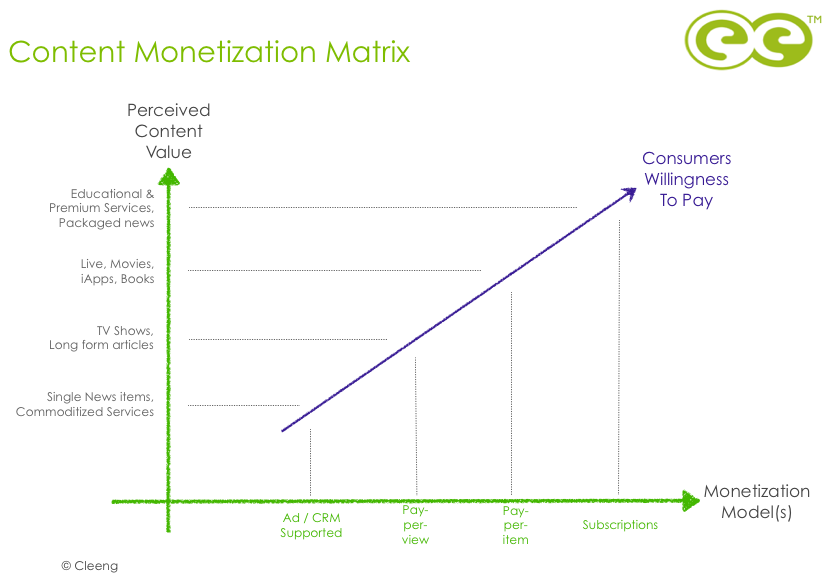Since we've launched Cleeng a few months ago, we have been in discussion with numerous different content publishers, and they all come up with same questions: How much is my content worth?
More recently we've also been talking with several VCs, which has generated a different set of questions, primarily: Do people buy content?
Well the truth is, is that all content is not born equal, thus it is very difficult to respond with a standardized answer. Take for example the recent survey conducted by the Reynolds Journalism Institute at the University of Missouri that analyzed 14,00 US daily newspapers. This survey showed that 46% of newspapers with a readership of under 25,000 say they are already charging for some online content. This compares to only 24% of papers with a 25,000+ circulation. On blogs, reaction to this data was that of surprise and it was generally thought that these percentages related to the drive of small newspapers to protect their content. Yet, there is another perspective to this. I believe that local newspapers have more unique, exclusive content that readers are willing to pay for. If you live in Denver, Amsterdam, Cannes, or Munich, you want to know what's going on in city in which you live, and this is something only local paper media sources can provide.
Coming up with the Content Monetization Matrix
We've looked at multiple industries publishing content from newspapers, to broadcasters, to movie studios, and to vertical sellers with educational, legal, and financial content. At Cleeng, we concluded that the right monetization tools need to be suited to the precise form of the content, from the highly commoditized (like daily national news, undifferentiated blogs, etc.), to premium content (educative materials, exclusive interviews, specific research, etc.).
How, then, do we measure the perceived content value?
- Uniqueness of the content: What's the weather today? An AP / AFP / Reuters news feed that provides these kind of content farm stories are hard to put a price tag on - these are commodities. If you are the New York Times, Die Welt, Le Monde, or Financieel Dagblad you sell more premium services, which are easier to monetize.
- Re-usability of content: How many times will I need this content? Most daily news items are read once and then become obsolete. However, you may watch a movie multiple times and are likely check a financial data repeatedly.
- Quality differentiation: Yes, content is a product and products have different quality. For instance, a good movie requires good actors, school books are difficult and labor intensive to create, and one can't really create legal news in a content farm... on the other hand, anyone can comment on the daily news.
- Emotional engagement: This is very subjective element, yet too often neglected. In need of some obvious examples? Think about a school book for your children - you are certainly paying attention to the quality of it and are generally ready to pay "any price" to make sure your loved ones get teaching material of the utmost quality. The same type of emotional engagement pertains to the music that makes YOUR heart leap for a few minutes, the actor YOU fantasize about, and the authors that truly makes YOU think and engage. That's precisely why it is difficult to monetize a blog, because most people don't know YOU. With persistence, over-time is might change.
Several important notes:
Note 1: The frequency of visits doesn't really matter. You may visit your favored news site daily (e.g. Yahoo News), yet you aren't likely to be ready to pay a subscription. Why? Since the perceived value is too small.
Note 2: By this (Note 1) we don't mean to say that news sites are condemned only to selling advertising, and won't be able to move to subscriptions. This caveat just functions to indicate the increased difficulty for news sites and that in order to maximize their potential, the news site must be very unique and relevant to its users (think local news or the NYT).
So, yes people are buying quality content online, from videos, to music, to books, and to high quality articles. Yet, there is not a "one solution fits all" type solution to the question of monetization, and that is exactly why we think we can really help this industry. Do you agree?




